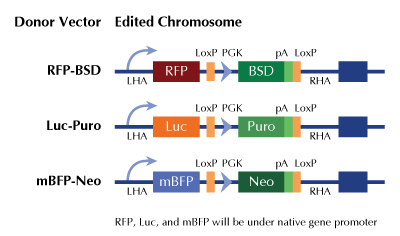AKAP12 Human Gene Knockout Kit (CRISPR)
CAT#: KN214439LP
AKAP12 - human gene knockout kit via CRISPR, HDR mediated
HDR-mediated knockout kit validation
CNY 12,260.00
CNY 3,710.00
CNY 1,999.00
CNY 2,700.00
CNY 11,976.00
Specifications
| Product Data | |
| Format | 2 gRNA vectors, 1 Luciferase-Puro donor, 1 scramble control |
| Donor DNA | Luciferase-Puro |
| Symbol | AKAP12 |
| Locus ID | 9590 |
| Kit Components |
KN214439G1, AKAP12 gRNA vector 1 in pCas-Guide CRISPR vector KN214439G2, AKAP12 gRNA vector 2 in pCas-Guide CRISPR vector KN214439LP-D, donor DNA containing left and right homologous arms and Luciferase-Puro functional cassette. GE100003, scramble sequence in pCas-Guide vector |
| Disclaimer | These products are manufactured and supplied by OriGene under license from ERS. The kit is designed based on the best knowledge of CRISPR technology. The system has been functionally validated for knocking-in the cassette downstream the native promoter. The efficiency of the knock-out varies due to the nature of the biology and the complexity of the experimental process. |
| Reference Data | |
| RefSeq | NM_005100, NM_144497, NM_001370346 |
| Synonyms | AKAP250; SSeCKS |
| Summary | The A-kinase anchor proteins (AKAPs) are a group of structurally diverse proteins, which have the common function of binding to the regulatory subunit of protein kinase A (PKA) and confining the holoenzyme to discrete locations within the cell. This gene encodes a member of the AKAP family. The encoded protein is expressed in endothelial cells, cultured fibroblasts, and osteosarcoma cells. It associates with protein kinases A and C and phosphatase, and serves as a scaffold protein in signal transduction. This protein and RII PKA colocalize at the cell periphery. This protein is a cell growth-related protein. Antibodies to this protein can be produced by patients with myasthenia gravis. Alternative splicing of this gene results in two transcript variants encoding different isoforms. [provided by RefSeq, Jul 2008] |
Documents
| Product Manuals |
| FAQs |
Resources
| 基因表达相关资源 |
Other Versions
| SKU | Description | Size | Price |
|---|---|---|---|
| KN214439 | AKAP12 - human gene knockout kit via CRISPR, HDR mediated |
CNY 12,260.00 |
|
| KN214439BN | AKAP12 - human gene knockout kit via CRISPR, HDR mediated |
CNY 12,260.00 |
|
| KN214439RB | AKAP12 - human gene knockout kit via CRISPR, HDR mediated |
CNY 12,260.00 |
|
| KN414439 | AKAP12 - KN2.0, Human gene knockout kit via CRISPR, non-homology mediated. |
CNY 8,680.00 |
|
| GA106424 | AKAP12 CRISPRa kit - CRISPR gene activation of human A-kinase anchoring protein 12 |
CNY 12,255.00 |


 United States
United States
 Germany
Germany
 Japan
Japan
 United Kingdom
United Kingdom
 China
China

